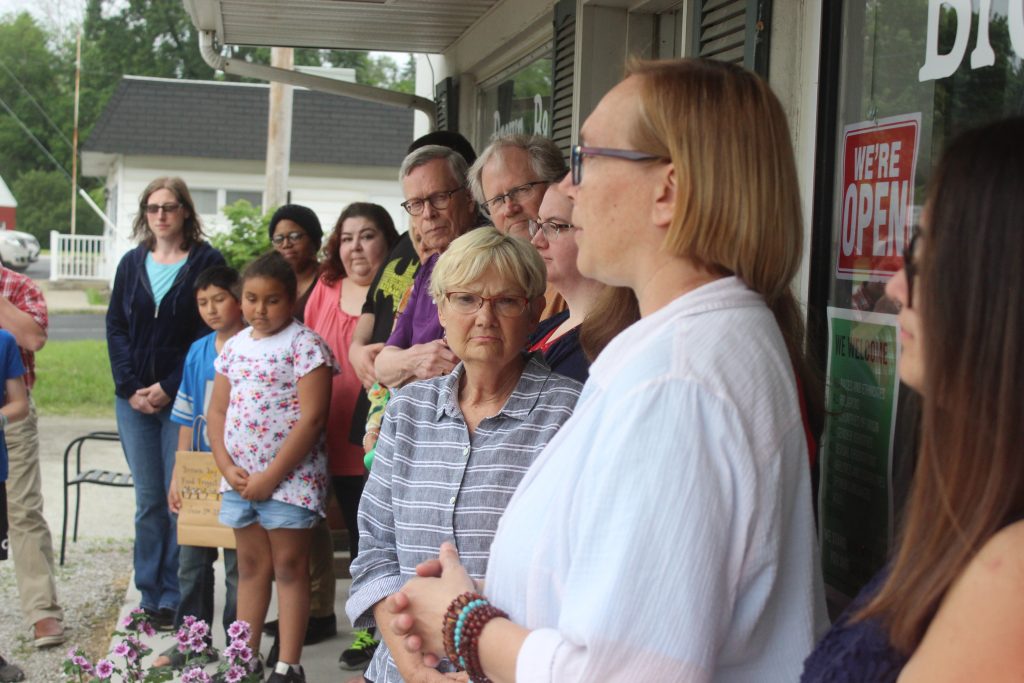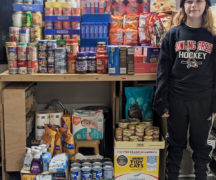By DAVID DUPONT
BG Independent News
For the Brown Bag Food Project, more space means more people fed.
Amy Jo Holland, who founded the emergency food pantry four years ago, said Brown Bag’s new location at 530 Sand Ridge Road in Bowling Green will allow the program to provide emergency food to people as often as every two months. Previously they only could help every six months, though some exceptions were made.
Holland started the project when she realized some of her fellow workers at WalMart were having a hard time feeding themselves and their families, and they didn’t necessarily qualify for government programs or meet the qualifications for food pantries.
So Brown Bag was formed. Its rapid growth is testament to the need. At first it operated out of the garage at the home of Peg Holland, Amy Holland’s mother. Then it moved to a site on West Merry Street in late 2016. Two months ago Brown Bag traded that 500-square-foot storefront for the 1,600-square-foot facility directly across the road from the entrance to the Slippery Elm Trail.

On Thursday dignitaries joined Holland and her board members in celebrating the project’s new home with a ribbon cutting sponsored by The Bowling Green Chamber of Commerce. Mayor Richard Edwards was there with the giant ribbon cutting scissors, and State Senator Theresa Gavarone presented Holland with a Senate commendation for Brown Bag’s work.
The project offers people who lack food a week’s emergency supply, just to tide them over.
They can offer canned foods, cereals, meats, breads, rice, beans, pasta and more. The goal is well-rounded nutrition. The program provides toiletries and sanitary products that can’t be purchased with SNAP benefits. They also have pet food.
Amy Jeffers, a board member, said that the need for the service is clear. Of the 14 percent of Wood County residents who are considered food insecure, almost half are not eligible for other feeding programs.
These are people working paycheck to paycheck, Jeffers said. “They have a car repair or a medical bill come up, and they need help. So we wanted to be there for them.”
Holland said: “We’re hearing about a lot of people working low-income jobs, a couple jobs, and it’s still not enough. And more and more people are getting their food stamps cut.”
Jeffers said that Brown Bag is now helping with conducting job searches, filling out applications, and writing resumes.
Brown Bag serves about 300 people a month. Holland hopes they can serve more now that they have more room and appliances.
She said donations to the project are keeping pace.
The project now has three refrigerators and two freezers. Those refrigerators will allow the project to offer more lunch meats and fresh produce. Last year Brown Bag worked with Riehm Produce Farm to take leftover produce from the city’s farmers market.
Jeffers said that Brown Bag will also deliver food to the elderly and disabled. The program serves the entire county, and it is hard for some people to make it into Bowling Green, especially given the county has no public transportation.
“A lot of people outside Bowling Green city limits have a problem getting into Bowling Green to get help, and they really need help.”
In her remarks during the celebration, Sandy Rowland, at-large representative on city council, said Brown Bag itself needs a ride. Not only does the project deliver, but it has to make trips to Toledo and elsewhere to pick up food. “Let’s give them a vehicle.”
In addition to the larger space, Holland said, the new location also offers greater accessibility. The previous facility had a couple stairs leading to the office, making it difficult for people in wheelchairs.
This is all on one level with an overhead door that can be opened to facilitate unloading of trucks.





